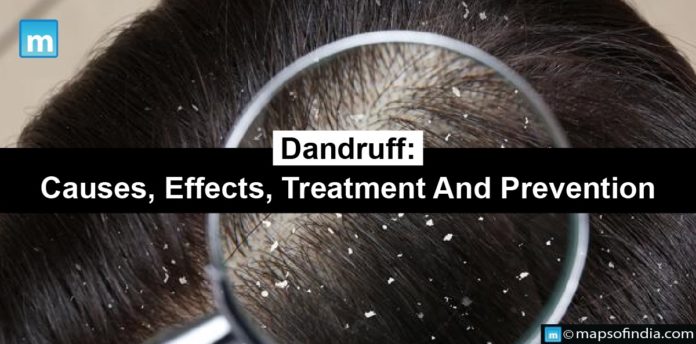Dandruff is a common scalp ailment characterized by the appearance of flakes of dead skin on the hair and shoulders. It is irritating and unpleasant, but it is not dangerous or contagious. Dandruff affects people of all ages. However, it is most prevalent in adults aged 20 to 50. Various treatments and preventative strategies are available to help control symptoms and decrease the appearance of dandruff. Let’s get to know more about this condition in detail:
Causes of Dandruff
-
Seborrheic dermatitis
This is a long-term skin disorder characterized by redness, scaling, and flaking on the scalp, face, and upper chest. It is thought to be caused by a mix of causes, including excessive sebum (oil production), irritation, and the proliferation of a yeast known as Malassezia.
-
Dry skin
Dry skin can cause flakes of skin to form on the scalp, as well as other places of the body. Various variables can contribute to dry skin, including cold temperatures, low humidity, and harsh shampoos.
-
Malassezia
Malassezia is a yeast that lives on most people’s scalps without creating any concerns. However, Malassezia can overgrow and create dandruff in some persons.
-
Other skin conditions
Dandruff is also linked to other skin disorders like psoriasis, eczema, and seborrheic dermatitis.
-
Hair care products
Some hair care products, such as hairsprays and gels, can irritate the scalp and create dandruff.
Effects of dandruff
Dandruff can have several adverse effects, including:
-
Itching
Dandruff can cause the scalp to itch. The itchiness can be mild or severe.
-
Flaking
Dandruff can cause flakes of skin to appear on the hair and shoulders. The flakes can be white or yellow.
-
Social isolation
Some people with dandruff may avoid social activities because they are embarrassed about their condition, especially if the flakes are visible on the hair or shoulders.
Treatments for Dandruff
-
Over-the-counter dandruff shampoos
These shampoos include chemicals that can aid with itching and flaking. Pyrithione zinc, selenium sulfide, and ketoconazole are frequent components of dandruff shampoos.
-
Prescription shampoos
If over-the-counter shampoos do not work, a doctor may recommend a stronger shampoo. Ingredients in prescription shampoos may include coal tar, corticosteroids, or ciclopirox.
-
Other treatments
Other treatments may be required in some circumstances to control dandruff. Antifungals, antibiotics, and steroids may be used in these treatments.
How to prevent Dandruff?
There is no guaranteed way to prevent dandruff, but there are several things you can do to reduce your risk of developing the condition or to make it less severe. These include:
-
Wash your hair regularly
Washing your hair regularly can help remove excess oil and dead skin cells from the scalp. However, shampooing your hair too frequently might dry out the scalp and aggravate dandruff.
-
Brushing Hair and Massaging Scalp
Brushing your hair regularly can assist in eliminating dandruff flakes from the scalp, and massaging your scalp can improve circulation and reduce inflammation.
-
Avoid harsh hair care products
Harsh hair care products, such as hairsprays and gels, can irritate the scalp and exacerbate dandruff. If you have dandruff, you should consult a doctor if it is severe or does not respond to over-the-counter remedies. A doctor can assist you in determining the root cause of your dandruff and recommending the best treatment option.




